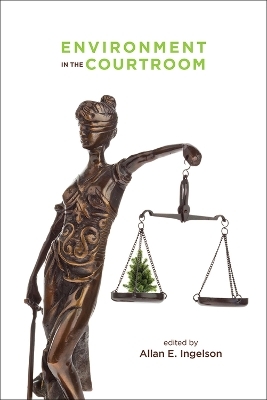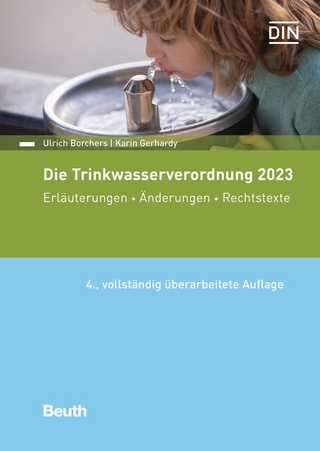
Environment in the Courtroom
University of Calgary Press (Verlag)
978-1-55238-985-0 (ISBN)
Canadian environmental law is a dynamic and exciting area that is playing an increasingly important role in furthering sustainable development policy. Environmental law has distinctive relevant principles, operating procedures, implications, and importance in comparison with other areas of law, and these distinctions must be appreciated both within the legal community and by all those who are concerned with the way that courts handle environmental cases. Environment in the Courtroom provides extensive insight into Canadian environmental law. Covering key environmental concepts and the unique nature of environmental damage, environmental prosecutions, sentencing and environmental offences, evidentiary issues in environmental processes and hearings, issues associated with site inspections, investigations, and enforcement, and more, this collection has the potential to make make a significant difference at the level of understanding and practice.
Containing perspective and insight from experienced and prominence Canadian legal practitioners and scholars, Environment in the Courtroom addresses the Canadian provinces and territories and provides context by comparison to the United States and Australia. No other collection covers these topics so comprehensively. This is an essential reference for all those interested in Canadian environmental law.
Allan Ingelson is an associate professor in the Faculty of Law, University of Calgary. His research focuses on regulation of the Canadian and international energy and mining sectors.
Preface
Section 1: Key Environmental Concepts and the Unique Nature of Environmental Damage
1. Sustainable Development Under Canadian Law Paul Halley and Pierre-Olivier DesMarchais
2. A Precautionary Tale: Trials and Tribulations of the Precautionary Principle. Chris Tollefson
3. Ecosystem Management: It's Imperative … Whatever It Is Michael M. Wenig
4. Public Nuisance: Public Wrongs and Civil Rights of Action Alastair R. Lucas, Q.C.
5. The Incorporation of an Environmental Ethic in the Courtroom Heather McLeod-Kilmurray
6. The Intersection of Human Rights Law and Environmental Law Nickie Nikolaou
7. Practical Engagement with Indigenous Legal Traditions on Environmental Issues: Some Questions Hadley Friedland
8. The Legal Concept of Sustainability Natasha Affolder
9. How Legal Design May Constrain the Power of Law to Implement Environmental Norms: The Case of Ecological Integrity in Canada's National Parks Shaun Fluker
10. Applying International Law to Canadian Environmental Law Charles-Emmanuel
11. The Role of International Environmental Law in Canadian Courts Phillip M. Saunders, Q.C.
12. Assessing Environmental Damages: How Much is Beauty Worth in Dollars? Giorilyn Bruno
Section 2: Environmental Prosecutions
13. The Exercise of Prosecutorial Discretion: Challenges to Environmental Prosecutions Alex Ikejiani
14. Regulatory Negligence in Environmental Law Lynda Collins and Jasmine van Schouwen
15. Strategic Decisions in Environmental Prosecutions Paul McCulloch and Danielle Meuleman
16. Federal vs. Provincial Crowning Susan McRory
17. Who Should Prosecute: Intragovernmental Aspects Martin Z.P. Olszynski
18. Science and Advocacy Heather McLeod-Kilmurray
19. Private Prosecutions Revisited: The Continuing Importance of Private Prosecutions in Protecting the Environment John Swaigen, Albert Koehl, and Charles Hatt
20. Due Diligence in Environmental Offences Rhonda M. Vanderhoek
21. Certain Defenses in Criminal Law of the Environment Jean Piette
22. Aboriginal Law in the Context of Regulatory Prosecutions Cheryl Sharvit
Section 3: Sentencing and Environmental Offences
23. Environmental Sentencing: Making the Best of a Blunt Instrument Judge Barry Stuart
24. Holding Directors and Officers Liable for Environmental Problems: Sentencing and Regulatory Orders Dianne Saxe and Meredith James
25. The Enforcement of Environmental Law through the Use of Administrative Penalties Jean Piette
26. Creative Sentencing in Environmental Prosecutions, the Canadian Experience: An Overview John D. Cliffe, Q.C.
27. Creative Sentencing: The Experience ""Down Under""Sharon Mascher
28. Creative Environmental Sentencing: The Corporate Perspective Allan Ingelson
29. Environmental Non-Governmental Organizations and Creative Sentencing: Perspectives and Roles Cindy Chiasson
30. Negotiating Sentences Peter J. Craig
31. Creative Sentence Negotiation: Looking Beyond Deterrence Paul Adams
32. The Law and Economics of Environmental Harm: A Primer and Update for Environmental Sentencing (Parts I & II) Martin Olszynski and Peter Boxall
33. The Law and Economics of Environmental Harm: A Primer and Update for Environmental Sentencing (Parts III, IV &V) Peter Boxall and Martin Olszynski
Section 4: Evidentiary Issues in Environmental Prosecutions and Hearings
34. Proving Causation: Scientific Certainty vs. Legal Burden of Proof Danielle Meuleman
35. Experts in Environmental Litigation Marc McAree, Robert Woon, and Anand Srivastava
36. Communication Between Lawyers and Experts Marc McAree, Robert Woon, and Anand Srivastava
37. Reporting Obligations to Third Parties Marc McAree, Robert Woon, and Anand Srivastava
38. Admissibility of Expert Evidence and Costs Marc McAree, Robert Woon, and Anand Srivastava
39. Experts Only Jim Bunting, Terri-Lee Oleniuk, and Sarah Powell
40. An Overview of Expert Evidence in Canada Gary A. Letcher and Andrea C. Akelaitis
41. Issues Respecting Expert Advisers, Expert Witnesses and Retaining Council Nicholas R. Hughes and Monika A. Sawicka
42. Continuity of Evidence and Remediation Advice for Investigators: Some Brief Comments John D. Cliffe, Q.C. and John S.G. Clark
43. Proving the Right to be Heard: Evidentiary Barriers to Standing in Environmental Matters Adam Driedzic
44. The Challenges of Gathering Expert Evidence by Private Individuals Asha James
45. Challenges in Using Aboriginal Traditional Knowledge in the Courts David Laidlaw
46. Privilege in Environmental Enforcement Erin Eacott
47. Judicial Notice of Climate Change Brenda Heelan Powell
Section 5: Inspections and Enforcement Issues: On-site and in Court
48. The Art of Responsive Regulation: How Agencies Can Motivate Regulated Firms to Become Virtuous James Flagal
49. Regulatory Inspections: A Private Practitioner's Perspective Katia Opalka
50. Anatomy of Compliance Regime: Imitations of Action-A Regulator's Perspective Fred Maefs
51. Collecting Essential Evidence for Environmental Investigations and Prosecutions: Approaches to Legal Strategy and Associated Issues Jack D. Coop
52. Environmental Investigations: A Government Perspective Paul McCulloch
53. Recapitulation and Alternatives: Lessons Learned From a Hypothetical Case Study Jennifer Fairfax
54. Anatomy of Compliance Regime: Recapitulation and Alternative Lessons from the United States Jonathan Leo
List of Contributors
Index
| Erscheinungsdatum | 09.11.2018 |
|---|---|
| Zusatzinfo | 15 tables, figures |
| Verlagsort | Calgary |
| Sprache | englisch |
| Maße | 226 x 208 mm |
| Gewicht | 1225 g |
| Themenwelt | Recht / Steuern ► Allgemeines / Lexika |
| Recht / Steuern ► EU / Internationales Recht | |
| Recht / Steuern ► Öffentliches Recht ► Umweltrecht | |
| Recht / Steuern ► Privatrecht / Bürgerliches Recht ► Zivilverfahrensrecht | |
| Technik | |
| ISBN-10 | 1-55238-985-5 / 1552389855 |
| ISBN-13 | 978-1-55238-985-0 / 9781552389850 |
| Zustand | Neuware |
| Haben Sie eine Frage zum Produkt? |
aus dem Bereich


